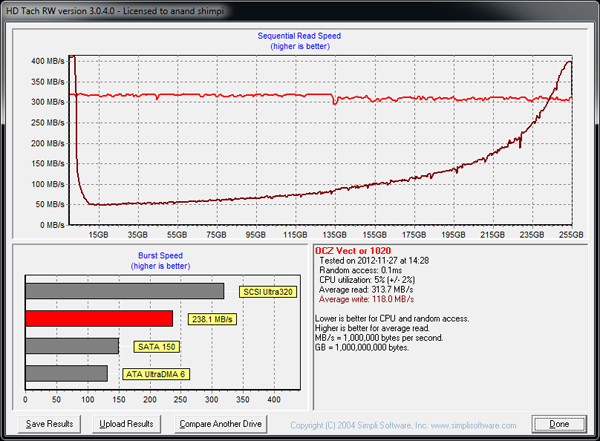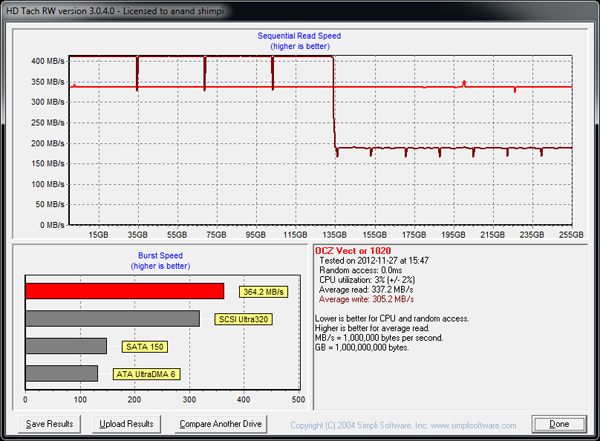OCZ Vector (256GB) Review
by Anand Lal Shimpi on November 27, 2012 9:10 PM ESTTRIM Functionality
Over time SSDs can get into a fairly fragmented state, with pages distributed randomly all over the LBA range. TRIM and the naturally sequential nature of much client IO can help clean this up by forcing blocks to be recycled and as a result become less fragmented. Leaving as much free space as possible on your drive helps keep performance high (20% is a good number to shoot for), but it's always good to see how bad things can get before the GC/TRIM routines have a chance to operate. As always I filled all user addressible LBAs with data, wrote enough random data to the drive to fill the spare area and then some, then ran a single HD Tach pass to visualize how slow things got:
As we showed in our enterprise results, Vector's steady state 4KB random write performance is around 33MB/s. The worst case sequential performance here is around 50MB/s, which is in line with what you'd expect. Sequential writes do improve performance, but as with most SSDs you're best operating the Vector with a bit of spare area left on the drive (in addition to what's already set aside by firmware).
TRIM and another sequential pass restore performance to normal, but it also triggers the Vector's performance mode penalty:
At 50% capacity there's an internal reorganization routine that's triggered on Vector, similar to what happens on the Vertex 4. During this time, all performance is impacted, which is why you see a sharp drop in performance just beore the 135GB mark. The re-org routine only takes a few minutes. I went back and measured sequential write performance after this test and came back with 380MB/s in Iometer. In other words, don't be startled by the graph above - it's expected behavior, it just looks bad as the drive doesn't get a chance to run its background operations in peace.












151 Comments
View All Comments
rob.laur - Monday, December 3, 2012 - link
the 840 Pro has terrible recovery when pushed hard.http://www.tomshardware.com/reviews/vector-ssd-rev...
jwilliams4200 - Tuesday, December 4, 2012 - link
I certainly would not call it "terrible" -- it actually looks pretty good to me. And if you want even better performance under sustained heavy workloads, just overprovision the SSD.dj christian - Monday, February 4, 2013 - link
How do you overprovision the SSD?somebody997 - Thursday, April 11, 2013 - link
You don't. Most SSDs will come in 128, 256 or 512 GB sizes. If you have an SSD and you see a decrease in size, usually at 120, 240 or 480 GB sizes, it means the controller has already over provisioned the SSD for you.batguiide - Sunday, December 9, 2012 - link
Thanks for these tips!share a website with you :socanpower,ca,You will love it! I believe!
jdtwoseven - Monday, December 10, 2012 - link
I have WAY too much scar tissue from this vendor to ever buy their products again. I bought five of their SSDs, and was five for five RMAing them back. I have the replacements, but don't trust them enough to use them in anything other than evaulation work because them are just not dependable. I would avoid them like the plague.somebody997 - Thursday, April 11, 2013 - link
I have had multiple SSDs from OCZ, and none of them have failed up till today. I boot Mac OS X from my OCZ Vector, and from every OCZ SSD before that. In my experience, it's not the OCZ SSDs that have terrible reliability, it's Windows. Besides, have any of you guys complaining about OCZ SSDs ever tried turning off automatic disk defragmentation in Windows?Windows has an automated disk defragmenting tool to defragment HDDs, but when you plug in an SSD, the tool is automatically disabled.
Chances are, those of you with SSD problems have a PC with windows that did not successfully disable automated disk defragmentation, and have had your SSDs killed due to that.
Mac OS X does not have an automated disk defragmenting tool as it generally tries not to write in fragments. Without the automated defragmentation tool, my OCZ SSDs have never failed.
ewh - Tuesday, April 30, 2013 - link
My Vector 256 drive completely failed in just under 4 months. OCZ is going to replace it but if the replacement fails in less than 48 months I will look for alternatives.jhboston - Wednesday, May 8, 2013 - link
My OCZ VTR1-25SAT3-512G failed after just 33 days. This was 3 days after the vendors replacement agreement expired. Has to go to OCZ, OCZ is replacing the drive, but they are following a delayed time frame to get the new drive in my hands.djy2000 - Wednesday, July 31, 2013 - link
Ok my OCZ vector catastrophically failed within 3 months :-( Think I'll be going with intel or samsung next